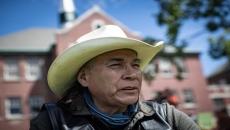Prime Minister Justin Trudeau is being allowed to check out from his quarantine hotel roughly 12 hours after checking in.
Trudeau's office says he received his negative COVID-19 test Wednesday morning and can now leave the three-star Ottawa lodging.
Members of his delegation to Europe who landed in Ottawa around 7 p.m. were tested on arrival and received negative test results the next day at about 8 a.m.
Those in the hotel were told to remain in their rooms, and were given lunch boxes on arrival and a boxed breakfast at their door.
Trudeau was overseas from last Thursday until Tuesday for summits with other G7, NATO and European leaders.
His office says Trudeau will follow public health rules and advice for Canadians returning from abroad during the pandemic, as will the officials and journalists who also went overseas.
The rules include quarantining for 14 days and taking another COVID-19 test about seven days after arrival.
Trudeau's overnight stay in a hotel came after his Liberal government had spent months defending the policy of forcing most Canadians returning from international travel to quarantine in a hotel room for up to three days at their own expense.
Ottawa has said the policy, along with its slate of other border measures, has been effective at limiting COVID-19 from entering the country, even though provinces have spent most of the spring battling a variant-driven deadly third wave of the pandemic.
An expert review panel recently said the hotel-quarantine policy had no scientific basis and recommended the government scrap it. The panel noted travellers who fly to the United States and return across a land border face no such rule.
The Opposition Conservatives have slammed the fact the Ottawa hotel Trudeau stayed at isn't one of the government-approved accommodations.






